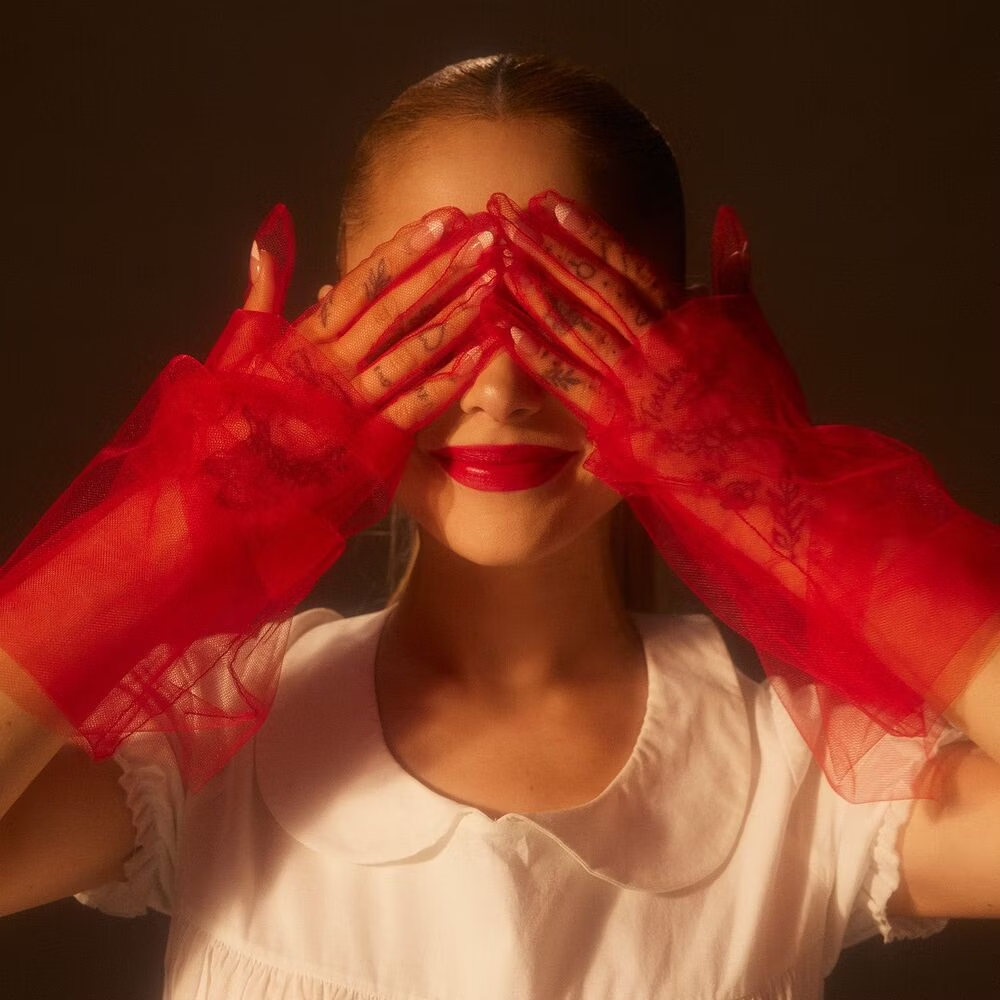“We needed real connection,” Erivo says of their friendship, which bloomed just as Grande needed it most: “Tabloids have been trying to destroy me since I was 19.”
“I’d offer you a seat outside, but I’m scared that the coyote is going to come,” Ariana Grande says sweetly.
“Literally an hour ago he just walked right over and jumped over the fence. I was like, Excuse me?” Coyotes can mercilessly attack small dogs, and Grande has two, Toulouse and Myron. “I take Toulouse out to pee, and I’m holding him while he’s pissing in the air,” she tells me, then addresses the coyote, wherever it may roam: “Eat me first!”
We’re standing outside “the tree house,” which is what Grande calls her bungalow tucked away in the Hollywood Hills. Soon we’re joined by Cynthia Erivo, who stars with her in one of the fall’s most anticipated films, Wicked. When she arrives, Toulouse and Myron bound toward her as though they’re greeting an old friend. Inside, Grande starts to make us all tea, but Erivo politely declines, holding up a thermos and taking a sip of her green elixir. “I made my own little matcha,” she says.
“I’ve always said that Wicked was the love story between two girls,” says Kristin Chenoweth. “Ariana and Cynthia are going to be a power couple.”
A Broadway show based on the novel of the same name by Gregory Maguire, Wicked is a musical prequel to The Wizard of Oz that imagines Elphaba and Glinda as frenemies before Dorothy dropped out of the sky. It premiered in October 2003 and dazzled audiences thanks to a stunning score by Stephen Schwartz and indelible performances by Idina Menzel and Kristin Chenoweth. After two decades in development hell, director Jon M. Chu has delivered a film adaptation that’s so confident in its zaniness, so assured in its world-building, and so defiantly big-budget that it sweeps you away like a house in a tornado. The performances are captivating across the board, but the story rests on Elphaba’s and Glinda’s shoulders. Fortunately they’re portrayed by Erivo, who’s got an Emmy, a Tony, and a Grammy, and Grande, a pop sensation with two Grammys and nine Billboard Hot 100 number one hits.
“I’ve always said that Wicked was the love story between two girls,” says Chenoweth. “The three things that I love about it are what I look for in all kinds of art that I do, which is love, forgiveness, and friendship. That’s what Ariana and Cynthia both have, and that’s why they’re going to be a power couple.”
Power couple really only scratches the surface.
In the original Oz story, the witches are polar opposites. Wicked posits that they’re more alike than they appear—much like Grande and Erivo, who crack up when the latter arrives and they discover they’re dressed in similar outfits. Grande has on a pink Khaite sweater, jeans from Agolde, and Tabis from Maison Margiela. Erivo is wearing Marni jeans, a blue J.Crew oversized cardigan over a Lunya top, and Bottega green sandals. Both have glasses on as well. “We do this every time,” Grande says.
But Grande and Erivo move through the world quite differently. The former is bubbly and bright, with a theater kid’s flair for the dramatic and confessional; the latter is kind but more guarded. The dynamic isn’t far from the one their Wicked alter egos share: Grande’s the girlish and gabby Glinda, while Erivo’s the more internal and reserved Elphaba. Even their nails seem in character: Erivo’s are long and green, while Grande sports an almondy pink manicure with French tips.
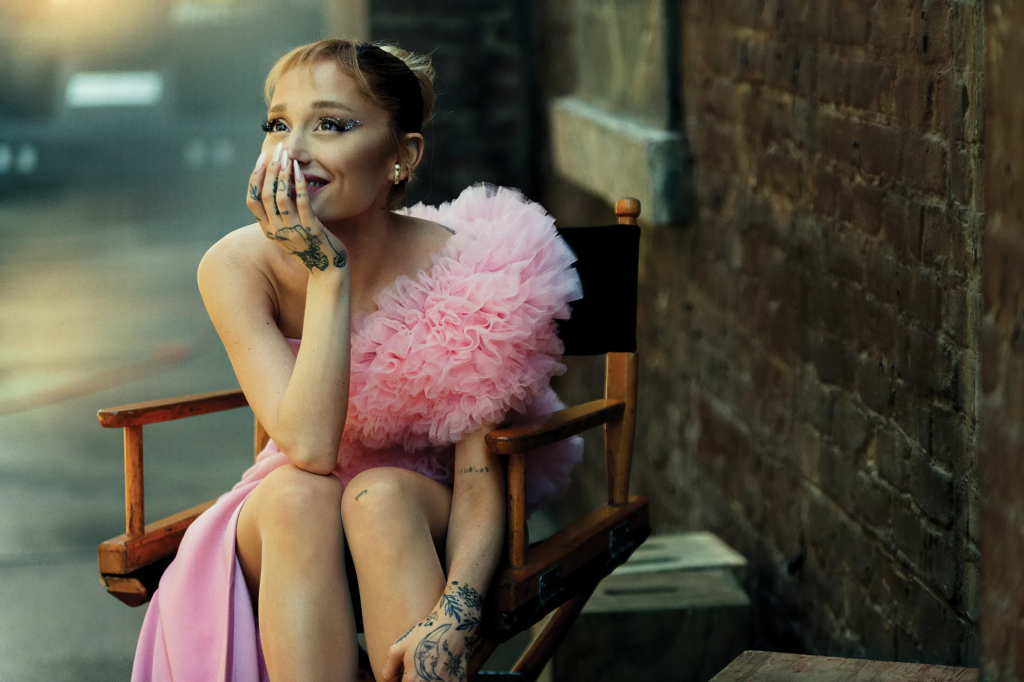
Like the witches they play, they approached the Wicked audition with radically different mindsets. “I didn’t even believe I would be seen,” Erivo says. “I was like, I don’t think this is going to happen, but I love the idea of watching this musical.” Until she booked an audition, she tried to shut out any and all intel about the process. “I kept telling my team, ‘Do not give me any information. I don’t want to know,’ ” she says. “ ‘I don’t want to know who’s gone in. I don’t want to know what people are being asked to do. I don’t want to know anything about it.’ ” And when she finally got in the room? “She embodied this version of Elphaba that I had never seen,” Chu tells me.
Grande had been pursuing the role of Glinda since she turned 20 in 2013. “She auditioned many times,” says Chu, recalling how the singer would regularly show up 30 minutes early and circle around in her car until it was time. “I sort of didn’t want to believe that she could do this. It seems almost too easy to say, ‘Oh, Ariana Grande.’ ” But time and again, Grande proved her worth. “Every time she came in, she was the most interesting person,” Chu says. “You just couldn’t take your eyes away.”
Ultimately, Grande was arguably too involved in the process. “I knew so many of the people that were going in, and everyone was texting me,” she says. “I was trying my very best to be 100 percent transparent with everyone. Like, ‘This is my tea. This is what I’m singing. I’m going in on the 13th. I love you. Text me after.’ ” She even helped a few people who were less familiar with the material prepare for their auditions by singing with them.
Erivo shakes her head in disbelief: “Ari, that’s crazy.”
“I know,” Grande says. “I had no boundaries back then.”
Erivo sighs: “I’m so glad we know each other now.”
They both find performing less unnerving than red carpets. “That is not scary at all,” Grande says. “That’s so lovely and thrilling.” Erivo agrees: “That’s like home.”
Grande lights a Diptyque candle, and we gather around her kitchen table to talk Broadway and RuPaul’s Drag Race All Stars, among other things. Both women launched their careers onstage—Grande as a teen in the musical 13 and Erivo earning acclaim as Celie in the 2015 revival of The Color Purple—showing off multi-octave vocal ranges that they’ve worked hard not to squander. Protecting the ability to option up to a mix-belted high G in “I’m Here” (Erivo) or nail the “God Is a Woman” outro (Grande) means avoiding loud places, late nights, and related vices. “We’re the most boring people in the world,” Erivo says. “We’re not party animals.”
Even when the pair showed up at the Met Gala in May, they were there to work: Grande had been secretly tapped to perform a seven-song set overseen by Baz Luhrmann, and she asked Erivo to join her for the finale. “That probably was my favorite Met Gala that I’ve been to, and I’ve been to a few,” Erivo says. “I felt really comfortable knowing that we could go and do what we’re really good at.”
“It was really fun,” Grande adds. “Those types of events—they used to make me really nervous. Crippling anxiety. I used to be, like, debilitated.”
Surely attending a social function and walking a red carpet is easier than performing for hundreds, if not thousands, of people?
“That is not scary at all,” Grande says. “That’s so beautiful and lovely and thrilling.”
Erivo agrees: “That’s like home.”
PRIDE AND JOY
Erivo has 15 minutes to get from Hudson Yards to Lincoln Center. Scratch that: The applause from her headlining set at Stonewall Day 2024 goes so long that it’s actually not over until 8:16 p.m. Now she has 14 minutes to get to David Geffen Hall, where she’s performing in a concert version of Stephen Sondheim’s A Little Night Music.
It’s the Friday of Pride weekend in New York City, about two weeks after our afternoon in Grande’s tree house. Since then, Erivo’s schedule has been, as she puts it, “insane.” She recently handed out the Tony Award for best musical alongside the original Elphie herself, Menzel, who told Erivo onstage how excited she was to see the movie. “I didn’t know that she was going to say what she said until she said it,” Erivo says. “It meant a lot to me. It was like the Queen Mother knighting you.” Later Angelina Jolie fangirled over her too—“she was so effusive and lovely”—and Erivo surprised herself by letting her proverbial hair down. “Usually I run off and go home. I don’t really get to enjoy the night that much,” she says. “But I stayed out and just had a really good time.”
Then it was back to work. Erivo flew to Los Angeles for a show at the Hollywood Bowl, then returned to New York for a single A Little Night Music rehearsal. Just typing it out gives me jet lag.
Even when she’s stretched thin, Erivo knows how to treat herself. “She flies so much, but she makes sure that she has the comforts of home,” says her longtime friend Colman Domingo, who’s flown with her. “She pulled out two blankets. She pulled out a humidifier. She pulled out her own kettle for her piping hot water. I was like, What? Apparently I haven’t been traveling well.” Erivo doesn’t drink alcohol. She loves a good cold plunge, has a wellness room in her LA home, and carries a ziplock bag of gummy vitamins everywhere, though after an abnormal blood test, she learned that you can, in fact, take too much vitamin D.
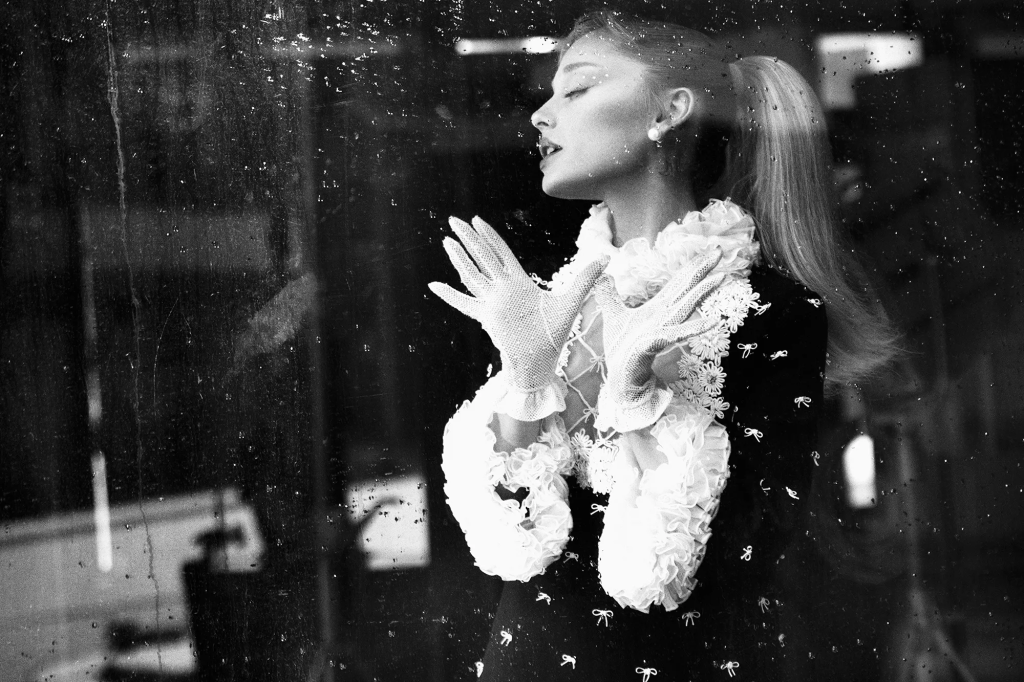
Erivo’s also an avid runner who once completed a half-marathon before performing a two-show day on Broadway in The Color Purple. “I run every morning,” she says. “I find that the best way to wake up my body is to be really physical.” Grande confirms this, playfully mimicking Erivo’s British accent: “She’ll be like, ‘I did a small one this morning. Only 11 miles.’ ”
“It’s a lifestyle,” Domingo says of Erivo’s devotion to well-being. “She’s like, ‘I take care of my voice. I take care of my body. And I take care of my soul.’ ” She takes care of others too. “When I got to London for rehearsals, she gave me Grether’s Pastilles for the first time,” her Wicked costar Bowen Yang tells me, referring to the Swiss throat-soothing candies that singers swear by. “I was like, ‘What are these?’ Now they’re in every room of my house. I suck on them every day.”
Those small indulgences also helped Erivo endure long sessions in the makeup chair, where Wicked’s team painted her Elphaba’s signature shade. “Two hours and 45 minutes to three hours if it was just head, neck, hands,” she says. “If it was the whole body, that was, like, four hours.” She also sat through multiple “green tests” before production landed on the ideal tint. “Some greens really didn’t work,” she says. “We had alien-esque ones that were just too far.” The best hue for Elphaba wound up having highlighter-yellow undertones. “On brown, it reads like skin.”
Then, of course, came lipstick, colored contacts, and four different wigs. To make certain the hair looked flawless on camera, Erivo shaved her head before production so they could paint her scalp too. She laughs remembering what she looked like before she put her wig on: “Green-scalp Cynthia. Like a little bald-headed green lady.”
She did it for the sake of the production, but honestly, Erivo was into the look: “I would love to do that again,” she says.
Grande has to wrap today’s music video shoot at 4 a.m. or else. We’re at a secret outdoor location in LA, where the shoot is set to begin at midnight. But Grande’s been at it since the early afternoon, rehearsing in full hair and makeup, and working with her stylist, Mimi Cuttrell, to find the perfect costume. When I arrive around 11:30 p.m., she bounds out of her trailer to greet me. “It’s trippy,” she says of the set, then twirls in the pink satin floor-length dress that she and Cuttrell settled on.
From her adolescence on Broadway to her days as a Nickelodeon star to her debut as a solo artist at the age of 18, Grande has clung to who she is. After seven studio albums, all those hits—including the synth-pop Robyn-esque breakup bop “We Can’t Be Friends (Wait for Your Love)”—and several world tours, she’s one of the biggest pop stars on the planet. As of this writing, she has nearly 100 million more followers on Instagram than Taylor Swift.
We walk to set, and Grande fills me in on the shoot: the camera angles, the significance of the setting, and how it all fits within the “short film” she plans to shoot for Eternal Sunshine, the concept album in which she processes her divorce from Dalton Gomez. Her involvement behind the scenes is worlds away from her experience on Wicked, where she had the luxury of simply being an actor. “We weren’t really watching dailies,” Grande said earlier of making the film. “We never watched playback. It’s very unlike me as well, ’cause when I’m doing a music video, I will watch everything.”
In between takes on her video shoot, Grande regularly dashes over to director Christian Breslauer to review the footage. “We have to make it cuttable—make it look like one shot, basically,” she tells me. “So I have to land in the exact same spot, and the camera has to land on the exact same spot—and we have two where it’s perfect. We’re going to try for one more, just in case.” Soon she’s skipping back to set. On her way, I hear her trill on a high-soprano note in the distance.
Grande’s calling card, her ace in the hole, her unassailable asset, is her voice. There’s a reason she was asked to sing “(You Make Me Feel Like) A Natural Woman” at Aretha Franklin’s funeral. So it’s ironic—absurd, really—that not long ago she was criticized for the way she speaks. As Wicked promotion kicked into gear, fans noticed her talking in a higher, lighter soprano than her naturally more earthy alto. Last summer a clip of Grande on Penn Badgley’s Podcrushed went viral when people accused Grande of slipping into a different register after she started to laugh. Grande finally addressed the accusations in a TikTok comment: “I intentionally change my vocal placement (high/low) often depending on how much singing i’m doing,” she wrote. “I’ve always done this BYE.”
Grande admits that the flak has been tricky to navigate: “There is a part of the world that isn’t familiar with what it takes to transform your voice, whether it’s singing or taking on a different dialect for a role or doing a character voice for something.” There’s also a double standard that punishes women who go the extra mile for roles. (See also: Gaga, Lady.) “When it’s a male actor that does it, it’s acclaimed,” Grande says. “There are definitely jokes that are made as well, but it’s always after being led with praise: ‘Oh, wow, he was so lost in the role.’ And that’s just a part of the job, really.” I can’t help but think of Austin Butler’s Oscar-nominated performance in Elvis. “Tale as old as time being a woman in this industry,” she says. “You are treated differently, and you are under a microscope in a way that some people aren’t.”
For the record, throughout our interviews, conversations, and voice notes—she loves to send a voice note—Grande uses all registers of her voice. If anything stands out, it’s the crispness with which she enunciates these days, popping her p’s and articulating her t’s like a 1940s star with a mid-Atlantic accent. This could be an overcorrection after years of being told she mumbles when she sings. Or maybe she’s still Glinda-ing. Either way, she’s happy with the results.
“It’s something that I’m just really proud of,” Grande says of her voice. “Part of why I did want to engage [on TikTok] is because I am really proud of my hard work and of the fact that I did give 100 percent of myself, including my physicality, to this role. I am proud of that, so I wanted to protect it.”
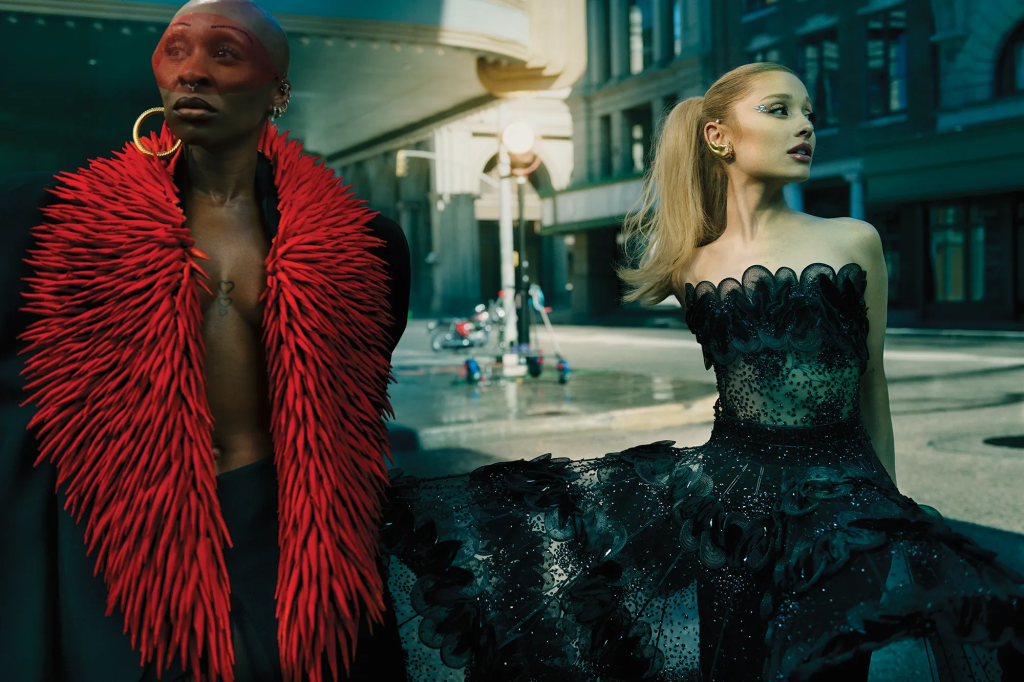
Erivo grew up in a largely single-parent household in London with her sister, Stephanie, and mother, Edith, who was a health visitor. (For the non-British, that’s someone who supports families during pregnancy and in the first few years after childbirth.) Growing up, Erivo gravitated toward music, dance, and art, then studied music psychology at the University of East London. At the time, she didn’t realize it was possible for her to major in drama. “I just picked the closest thing I could think of to what was creative,” she says. During that time, she moonlit as a singer at London venues like the Pigalle Club, the Arts Club, and Troy Bar. She ditched school and enrolled in a young actor’s program, where a teacher urged her to apply to the Royal Academy of Dramatic Arts. “She said that I couldn’t do the course if I didn’t apply,” Erivo recalls. Of course, she got in.
Now Erivo is RADA’s vice president and, in her increasingly vanishing spare time, teaches master classes. Her specialty is the voice. “That’s the thing that I want to go back and study at drama school—the way in which we use our voices and what we leave behind if we don’t use the voice that we’re given,” she says. When she’s daydreaming, Erivo thinks about pursuing another degree in the subject: “I have an honorary doctorate at Boston Conservatory, but I would like to do it properly.”
That honorary doctorate sits on a crowded shelf. With The Color Purple, Erivo went from virtual unknown in the US to leading lady and Tony winner in short order. Erivo says she “lived like a monk” to play the vocally demanding role. The first time she got sick and had to miss a performance, she cried.
She launched her film career with supporting roles in the heist film Widows and the thriller Bad Times at the El Royale, getting a master class in screen acting from Viola Davis, Daniel Kaluuya, and Steve McQueen. She’s grateful she had those experiences before playing Harriet Tubman in the eponymous 2019 film: Going straight from The Color Purple to Harriet “would’ve been almost impossible,” she says. “I don’t think I would’ve had all of the tools that I needed.” Erivo was drawn to Harriet for both its historical import and its nuanced depiction of an icon. “People don’t realize that she was so young when she was doing this,” she says. (Tubman was 27 when she escaped slavery.) “She had to throw herself in the face of danger consistently. And she was in love. She wanted to have kids but couldn’t. There was such a heartbreaking story that wasn’t just about how many lives she saved.” Erivo earned two Oscar nominations for Harriet—one for best actress, the other for cowriting the original song “Stand Up.”
As Erivo closes in on an EGOT, she has also, counterintuitively, embraced fallibility. During an A Little Night Music performance this summer, she fumbled part of the show’s challenging eleven o’clock number, “The Miller’s Son”—getting so mixed up she had to ask conductor Jonathan Tunick to stop his orchestra and restart the song. Many people would have been embarrassed, but Erivo thought the moment was glorious. “It’s something that we don’t give ourselves the space to do, and we don’t realize that it is really refreshing for an audience to see,” she says. “You remind them that they’re in safe hands and if anything’s going wrong, I’m going to press the Pause button and we’re going to start again. They go, ‘This person is in control of the situation and they’re going to take care of me and themselves.’ ”
WITCH CRAFT
When filming began on Wicked, Erivo and Grande vowed to take care of each other and not to allow the stress of production to get in the way of their new friendship. The roles, after all, had a bit of a reputation: Menzel and Chenoweth were rumored to have a backstage rivalry, and the whispers only ramped up when both were nominated for the same Tony. Though the pair have made friendly appearances together since, it took them two decades to really address their alleged feud. As for the new Glinda and Elphaba? “We communicated like the fucking champions of communication of the world,” Grande says. “I’m so grateful for it because we kind of looked at this and we said, ‘Oh, that’s not an option. That’s not going to happen to us.’ ”
Erivo confirms this: “We needed real connection, and we needed to lead this with love—even in the moments that are supposed to be fraught with tension within the piece.”
Wicked has an abundance of magic and whimsy, but there were plenty of hard days on set. Both actors say the most difficult day was the Ozdust Ballroom sequence, where Glinda gives Elphaba a “hideodeous” black hat that makes her the laughingstock of Shiz University. Onstage, the moment is played mostly for laughs. The film dives deeper into Elphaba’s humiliation, and Erivo’s performance is heart-wrenching. “It’s just not a fun thing—if you are doing it as truthfully as possible—to have to do over and over again,” she says. “By the time we had gotten to the last time, I was like…”
Grande chimes in. “Marc and I”—that’s producer Marc Platt—“demanded you leave.”
“Yeah, I had a big old breakdown,” Erivo says and notes that her bond with her costar helped them navigate tough moments. “There are days when she’s gonna need space, and there are days when I’m gonna need space. But because we love each other very dearly, it’s okay.”
“I think we’ve done a really beautiful job of…oh my God, sorry,” Grande says, warding off tears. “We both really took the time to get to know the other person and where we’ve been. What our little wounds are. What our little things are.”
How did Grande and Erivo juggle the demands of everyday life during shooting? Erivo, a queen of compartmentalization, says she managed just fine. “I think you take it in chunks,” she says—memorizing lines, doing vocal rehearsals, catching up on non-Wicked responsibilities. “I’m really kind of good at doing emails,” she says. “Usually I save it up until I’m like sat in one place and I can just—”
Grande interrupts. “This girl—I’m sorry, if you don’t mind, I’m gonna be Cynthia. Here we go.” She gets up and starts imitating Erivo as she was moments before shooting “Defying Gravity,” Elphaba’s barn-burning act one finale. “Green, hat, harness, flying in a second,” Grande says, painting the picture. She then begins furiously fake texting, French tips clacking on her phone. “They are like, ‘Camera’s up,’ and she goes, ‘Bag.’ ” Grande mimes putting the phone into a pretend purse, then effortlessly hits the famous “aaaahhAhhAhhAAAHHH” riff at the end of the song, which Wicked fans refer to as Elphaba’s battle cry.
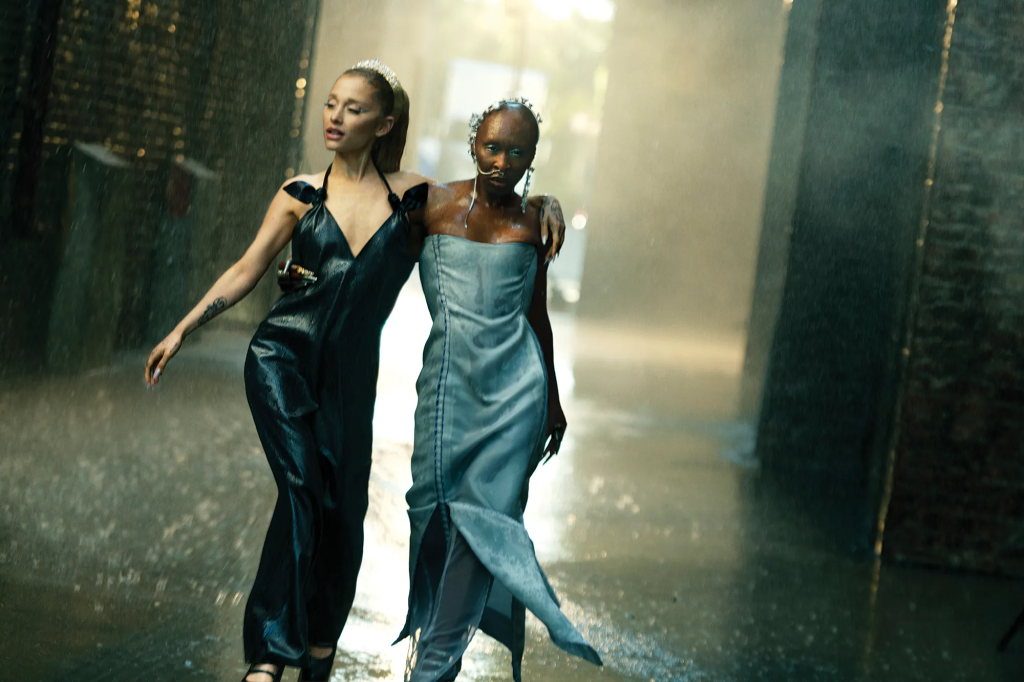
Grande says she is not a multitasker. “In the beginning, I literally had a separate phone,” she says. “The only numbers were Cynthia and Jon. I was like, ‘Hi, family? I will speak to you on Sunday.’ ” Despite her claims, Grande was running a beauty and fragrance empire throughout the making of Wicked. “In the break, she’s business lady,” Erivo says. But when Grande was concentrating on the shoot, she couldn’t focus on anything else. “For me, for my bandwidth, I need to have healthy boundaries sometimes because I sponge up everything,” she says. “I can offer myself to this better if something doesn’t come in that’s like a strange curveball in my head.”
Having lived most of her life in the spotlight, Grande is used to the unpredictable twists of fame. “The back-and-forth throughout the course of my career has been really hard to navigate mentally,” she says. “I was this approachable, funny redhead on Nickelodeon and everyone liked me. And then I had one too many hit records, and everyone decided that I was an evil diva. And then other terrible things happened, and all of a sudden I was this hero and this victim.”
That’s a condensed career time line, but it’s on the money. Grande starred in Nickelodeon’s sitcoms Victorious and Sam & Cat, and hit the music scene as a fresh-faced, golden-voiced revelation with hits like “Problem,” “Break Free,” and “Bang Bang.” “It was like everyone was rooting for me,” she says. Though there was the cost of doing business—Grande’s hair was so damaged by hair dye and bleach that she almost always wore it in a high pony—she was adored by both critics and audiences.
Then, yes, there was backlash, weirdness, and tragedy. In 2015, when she was 22, Grande was caught on a surveillance camera licking a doughnut and saying she hated America and Americans. There was also a bizarre rumor that Grande insisted on being carried everywhere. In 2017, all the foolishness was put in perspective when a suicide bomber attacked the Manchester stop of her Dangerous Woman world tour, killing 22 concertgoers. The next year, her ex-boyfriend and collaborator, rapper Mac Miller, died of an accidental overdose at 26.
You might expect Grande to be guarded now, but she’s exceedingly forthcoming. Even a cursory listen to confessional tracks like 2018’s “Thank U, Next” or the entirety of Eternal Sunshine makes this clear. What’s more surprising than her openness is Grande’s sense of humor. “She talks and thinks like a comedian,” Yang says. Earlier this year they starred together in a Moulin Rouge–inspired SNL sketch that went viral. “Ari knows that point of entry in any conversation to zing it in for a laugh. That is something that you thought went away with, I don’t know, the cast of the Golden Girls. That Floridian streak lives in Ari.”
While we’re looking at bloopers from Wicked on Grande’s computer at the tree house, I excuse myself to use the restroom and leave my phone on the table. Weeks later, when I’m going over the audio recording, I’ll hear her watching her own bloopers—and whispering to Cynthia, “Oh my God, I’m funny.” When she’s right, she’s right. And Grande gets her best comedy showcase yet in Wicked, nailing both zingers and pratfalls.
I ask where she gets her sense of humor. “My dad has amazing taste in comedy, movies, and stuff,” she says, then shouts out some of her favorite comic actors in musical theater: Chenoweth, Sherie Rene Scott, Sara Ramírez, Sutton Foster. But humor also serves a deeper purpose. Grande says it’s been “a coping mechanism for a long time, I suppose.”
She has fond memories of starring on Victorious with one of her best friends, Liz Gillies. But that experience has been cast in shadow since this year’s docuseries Quiet on Set, which alleges that ex-Nickelodeon producer Dan Schneider presided over toxic work environments where at least one child star, Drake Bell, was sexually abused by an adult he worked with. After Quiet on Set premiered, Schneider issued a mea culpa on YouTube—“I definitely owe some people a pretty strong apology,” he said—but then sued several companies and individuals involved with the docuseries for defamation.
Grande was shocked even by the sexual innuendo that was found in the old scripts. “You don’t remember some of it, and then it’s thrown into this compilation in this thing, and you’re like, ‘Wait, that happened? I can’t believe that!’ ” After a moment she adds this: “The most important thing we can do is focus on making the working environment safer for all performers and artists—even musicians. If you’re going to sign to a major label and your life’s going to change the way that mine did, there should be therapy in the contract. You should have support on the mental side because it’s not normal. Nothing can really prepare you for what comes with this amount of visibility.”
FLOATING ON AIR
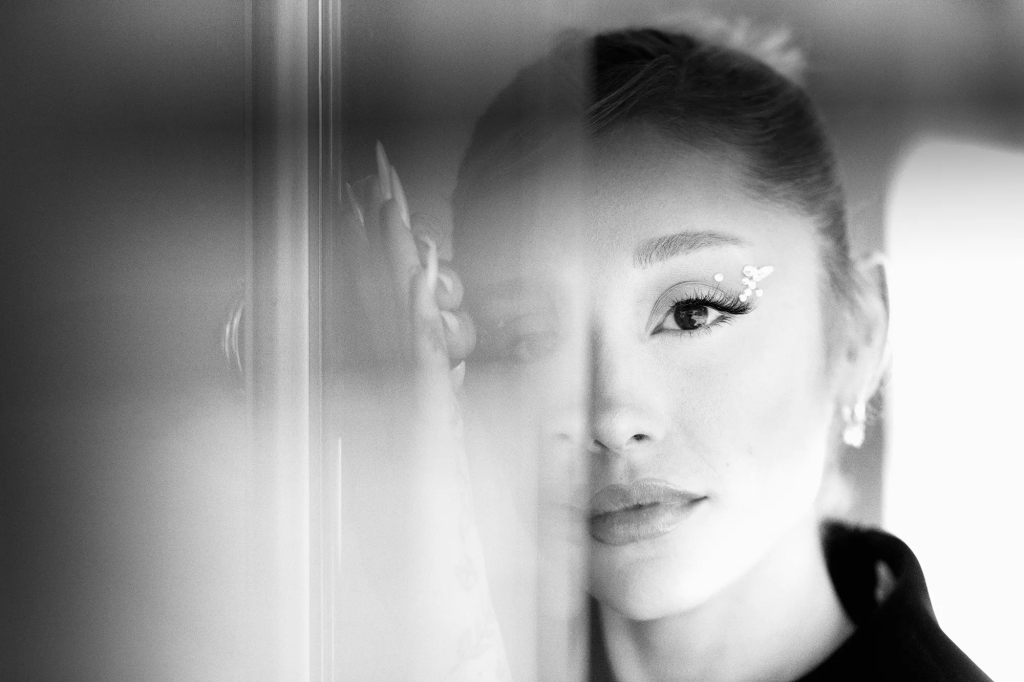
Grande’s relationship status has been a matter of public interest for over a decade, from her high-profile relationship with rapper Big Sean to Miller to her brief engagement to SNL alum Pete Davidson. The scrutiny re-intensified in the summer of 2023, when Grande was reported to be dating her Wicked costar Ethan Slater. Grande had separated from her husband months before the rumors circulated, but tabloids feasted on the fact that Slater, a Tony nominee for playing the title character in SpongeBob SquarePants the Broadway Musical, had a wife and child. (Slater was also said to have separated from his wife earlier and was officially divorced in September.) “It definitely doesn’t get any easier, seeing some of the negativity that was birthed by disreputable tabloids,” Grande says. “Of course, I went through a lot of life changes during the filming of this movie. A lot of people that were working on it did. We were away for two years. So, of course, I understand why it was a field day for the tabloids to sort of create something that paid their bills.”
Grande is aware of the public’s perception of her new relationship. Look no further than Eternal Sunshine, where she sings from the perspective of someone falling in love against her better judgment and defying the haters. In the spoken-word bridge of one of the tracks, she flat-out asks, “Why do you care so much whose dick I ride?” The popular narrative, Grande says, doesn’t accurately reflect her and Slater’s original story. “The most disappointing part was to see so many people believe the worst version of it,” she says. “That was definitely a tough ride.”
Particularly because Slater has been depicted as somebody who stepped out on his wife and baby to date a pop star. “There couldn’t be a less accurate depiction of a human being than the one that the tabloids spread about him,” says Grande. She disputes specific allegations but tells me she “will never go into certain details.” Instead, she emphasizes her partner’s strength of character. “No one on this earth tries harder or spreads themselves thinner to be there for the people that he loves and cares about. There is no one on this earth with a better heart, and that is something that no bullshit tabloid can rewrite in real life.”
“Honestly, it’s taken me a lot of hard work to be able to last this long and to heal certain parts of my relationship to fame and to what I do because of these tabloids that have been trying to destroy me since I was 19 years old,” she continues. “But you know what? I’m 31 years old and I’m not a perfect person, but I am definitely deeply good, and I’m proud of who I’m becoming. I will never let disreputable evil tabloids ruin my life or my perception of what is real and good.”
Moments into her Stonewall set, it’s clear that Erivo is most comfortable and powerful when she’s center stage. She opens with a groovy R&B-forward cover of Whitney Houston’s “I Wanna Dance With Somebody,” which features a telling word change: “I need a girl who’ll take a chance / on a love that burns hot enough to last.” Erivo then delivers a no-skip, Pride-perfect set of covers. “I wanted artists that were either queer or had been known to be allies,” she says later. “I started with Whitney—and we know the story—and then went to Sylvester, a queer icon. Prince is definitely, definitely a cool ally, who just is like, ‘If you got it, you got it.’ ”
Erivo refers to herself with the inclusive term “queer.” When I ask if there’s a special person in her life, she warmly but firmly declines to answer. “I’m very tight-lipped with my relationships, ’cause I don’t think that my relationship is for anyone else but for me,” she says. “I spend so much of my life sharing everything—whether it’s my work or my soul or my life in speeches. I think I give enough of myself that I’m allowed to keep something for me.” She pauses. “And who knows, maybe I’ll change my mind at some point. But, I think it’s okay. It’s enough for people to know that I’m a queer person who could have relationships with men or women or neither.”
Getting to this place as one of a handful of Black queer A-listers in Hollywood took years for Erivo. “I feel really grateful for getting to see the full picture of who I am and who I want to be,” she says. “I feel comfortable in myself. There’s an ease that I’ve experienced these last couple of years where I just feel very, very much like me.” Erivo is aware of the symbolic power she holds as a Black queer woman in Hollywood and takes it seriously: “I know that there are young people who are seeking out women in entertainment who are proudly queer and just thriving and living and enjoying their lives.”
Wicked has been an enormous undertaking, but the film coming out in November only tells half of Elphaba and Glinda’s story. There’s a second movie—and promotion cycle—coming next year at the same time. (Thankfully, they shot both back-to-back.) How are its stars feeling about that?
“I keep having to remind myself, Wait a minute, we have another movie to do next,” says Erivo.
“I remember it every day,” quips Grande.
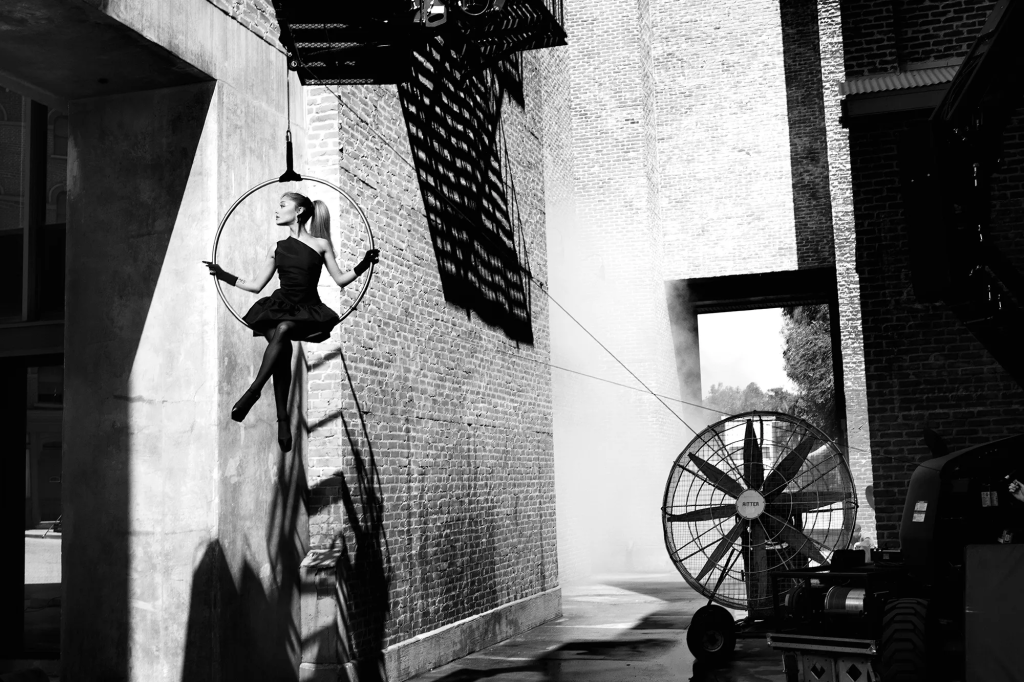
In the meantime, there’s a lot to look forward to. After a disappointing experience with her first album, Erivo is recording new music. “The last time I made an album, we were in the pandemic, so we were basically doing it over Zoom,” she says. “I was trying to put something together that had to come from me—and I was with the wrong people.”
Meeting Grande helped her move in a more fruitful direction. “This time, I have the right team because this one was sent into my life,” says Erivo, smiling at Grande. She tells me her costar introduced her to her new A&R person, Wendy Goldstein, and is even helping with production on some of the songs. The album, Erivo says, will be “voice-focused” and resemble “a bed of sound,” flush with harmonies and vocal layering.
“Make my bed!” Grande shouts.
Making music again puts Erivo in a vulnerable place. “I don’t know why this makes me emotional,” she says, “but as someone who’s found it really hard to navigate the music industry, just watching her manage it at the same time as doing this project was really inspiring. Because she has such a clear vision about what she wants to do and how to do it.” She credits Grande with “giving her permission” to make the music that she wants to make.
“I had worked with so many people who had their own agenda and their own ideas as to what I should be doing,” Erivo says, then turns to Grande. “I think, from you, I’ve learned to be a little easier on people. I expect a lot from people. And I don’t really mince my words with anyone. You get straight shooter from me, immediately. Like, ‘What are we doing?’ Is that not a phrase I kept saying? ‘What are we doing?’ ”
“It’s just that you don’t self-abandon for the sake of others’ comfort,” Grande says. “That is a big thing that I learned from you. Not to get emotional, sorry. But that same thing is what I needed.” Her voice breaks. “I needed to be able to be a straight shooter and be honest about my feelings. And then here comes this walking example of truth and strength and loving empowerment.”
“I don’t even know if you realize how much you’ve grown, how much you’ve become yourself,” Erivo tells Grande. “It’s been really beautiful to watch every time you’ve taken a stand for yourself.” To me, she adds, “A year ago, she wouldn’t have done that.”
That growth, Grande says, also came courtesy of Glinda. “There’s a part of it that has to do with playing a character that is so sure of herself—even sometimes in a delusional way,” she says. “It’s interesting, because when you slip back into not doing that, your body’s like, ‘Wait a minute. I liked that feeling. I loved believing in myself.’ ”
Wicked changed Erivo as well, in a more intangible way. “Someone said to me that I was going to start falling in love with what I looked like as Elphaba, more than I would with myself,” she says. But the opposite occurred. “I started to appreciate my own face even more,” Erivo says. “I like what I see.”
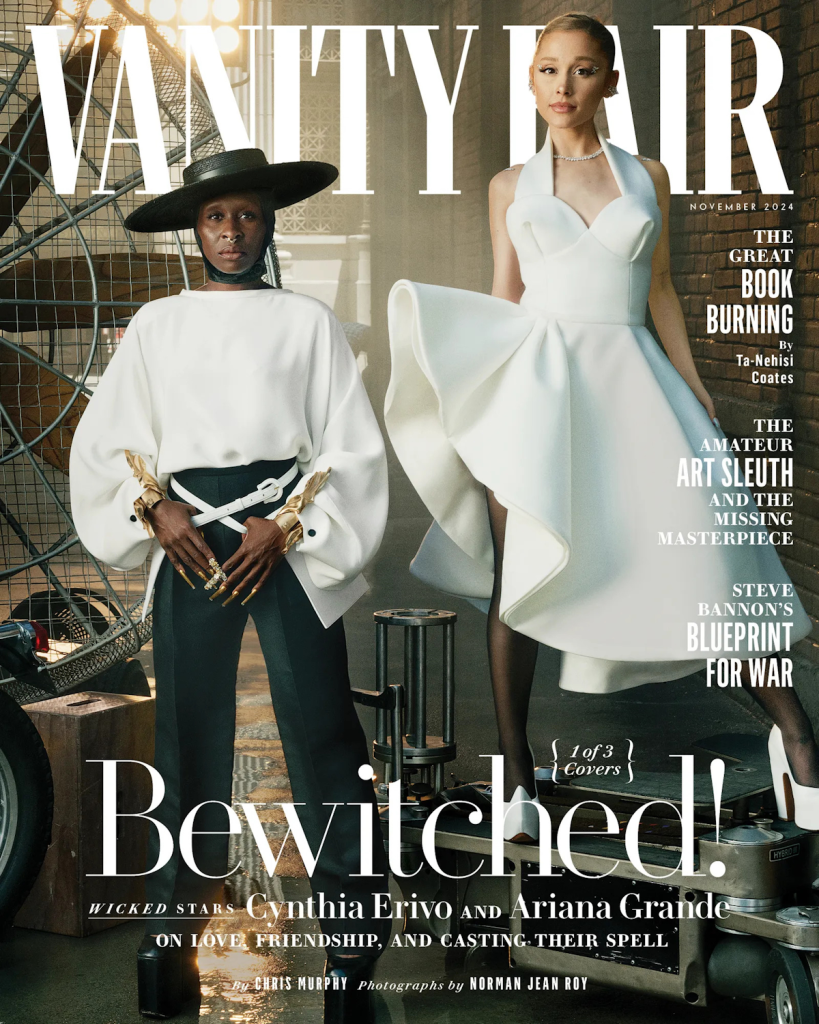
HAIR, ALYX LIU (GRANDE); MAKEUP, MICHAEL ANTHONY (GRANDE), JOANNA SIMKIN (ERIVO); MANICURES, CORALIA FUENTES (GRANDE), ROSE HACKLE (ERIVO); TAILORS, HASMIK KOURINIAN, MARI MARGARIAN; SET DESIGN, VIKI RUTSCH. PRODUCED ON LOCATION BY PORTFOLIO ONE. FOR DETAILS, GO TO VF.COM/CREDITS.
